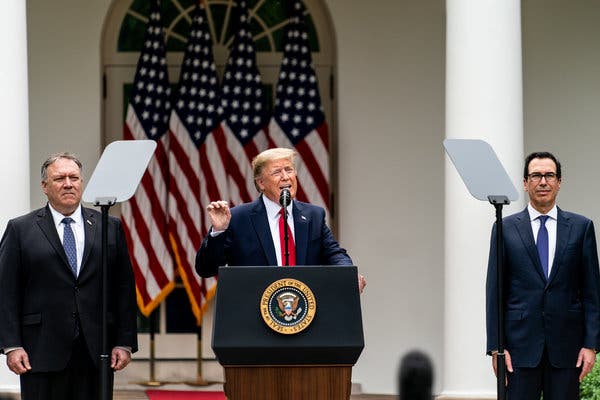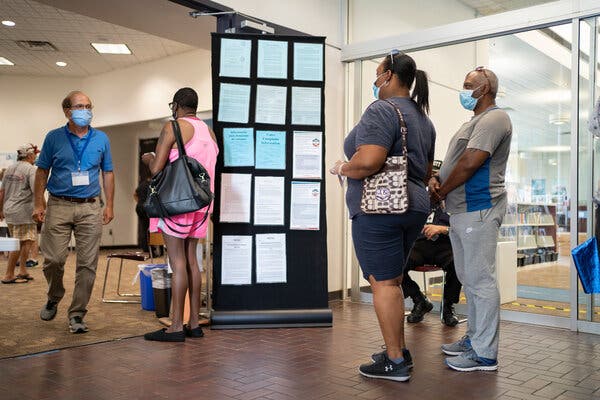Advertisement
Critics say the actions would do little to blunt China’s influence and could ultimately hurt the U.S. and others.

But the president was unclear about the speed and full scope of the actions, and his remarks left many questions unanswered. Stock markets rose after Mr. Trump’s speech in the White House Rose Garden, suggesting that investors had feared the president would take even more draconian steps against China, the world’s second-largest economy.
Mr. Trump voiced a range of grievances against China’s “malfeasance,” angrily denouncing the country’s trade and security practices and its crackdown on civil liberties in Hong Kong, as well as its influence at the W.H.O.
As punishment, the president said he would begin stripping away Hong Kong’s privileges with the United States, including an extradition treaty and commercial relations, with few exceptions. He said that Hong Kong would be subject to export controls that prevent China from gaining access to certain types of advanced technology, but he did not specify whether the tariffs that apply to imports from the mainland would be expanded to Hong Kong.
“My announcement today will affect the full range of agreements we have with Hong Kong,” the president said, including “action to revoke Hong Kong’s preferential treatment as a separate customs and travel territory from the rest of China.”
Mr. Trump’s announcement came largely in response to Beijing’s move this week to put in place broad new national security powers over Hong Kong. On Wednesday, Secretary of State Mike Pompeo announced that he was reporting to Congress a determination that Hong Kong no longer had significant autonomy under Chinese rule. Mr. Pompeo’s finding amounted to a recommendation that the United States should reconsider its special relationship with Hong Kong.
The president said the new security law for Hong Kong “extends the reach of China’s invasive state security apparatus into what was formerly a bastion of liberty.” He added that Chinese and Hong Kong officials deemed responsible for the rollback of liberties in the territory would be subject to sanctions.
There was no immediate response from officials in Beijing or Hong Kong. Global Times, a state-run Chinese newspaper, said in an unsigned editorial early Saturday that Mr. Trump’s moves would only strengthen China’s position and further unite its people against the United States.
“Washington is making a bigger gamble, but America’s economy is not as fat as it once was, and it still coughs from the coronavirus,” the editorial read. “Their extreme tactics amount to nothing more than the slow suicide of a superpower.”
Mr. Trump’s decision could have significant implications for Hong Kong and its 7.5 million residents, many of whom have fought to preserve individual liberties and rule of law — both central to the territory’s status as a nexus of global capitalism — in the face of growing pressure from the Chinese Communist Party. Mr. Trump’s actions could further erode international confidence in Hong Kong’s ability to maintain its singular identity and its advantages in serving as a base for Chinese and foreign companies.
But several analysts reacted with caution given the many unknowns surrounding what actions, precisely, Mr. Trump would take.
“Although there was a lot of fire and brimstone in the president’s remarks, there were few details,” said Scott Kennedy, an expert on China economic policy at the Center for Strategic and International Studies. “This could be devastating or of limited consequence depending on how the U.S. proceeds.”
American corporate executives and the U.S. Chamber of Commerce, which represents American businesses in Hong Kong, have cautioned the Trump administration against acting hastily to alter the special relationship, in which the American government gives the territory advantages with regard to tariffs, export controls, visas and law enforcement cooperation that mainland China does not enjoy.
A Chinese Foreign Ministry spokesman said this week that China would take “all necessary countermeasures” against actions by other nations over the Hong Kong issue. China relies on Hong Kong as a first stop for financial and commercial transactions. Many relatives of top party officials do business and own property there, so they are invested in maintaining positive global perceptions of the territory’s status. And many Chinese companies raise capital by listing on the Hong Kong Stock Exchange.
Some experts warned that Mr. Trump’s actions might ultimately give Chinese officials a greater opening in their efforts to consolidate control of the territory.
“The United States has very few options that would help Hong Kong resist Beijing’s efforts to curtail its autonomy,” said Jessica Chen Weiss, a government professor at Cornell University.
A confrontation between the two powers over Hong Kong, she added, “would probably do more to hurt Hong Kong than persuade Beijing to alter course.”
Relations between the United States and China are at their worst point in decades. Now, after two years of fights over trade and technology, Hong Kong and the coronavirus pandemic have emerged as new sources of conflict, accelerating the downward spiral of the relationship between the world’s two largest economies.
Flanked by top national security and economic officials, Mr. Trump delivered a scathing indictment of Chinese behavior that echoed an emerging line of attack in the president’s re-election campaign, as he seeks to deflect blame for his administration’s failure to stem the pandemic that has killed more than 100,000 Americans.
It was unclear from Mr. Trump’s announcement whether he was issuing a formal executive order to entirely end the special relationship with Hong Kong. The administration can take piecemeal actions — for example, imposing the same tariffs on goods from Hong Kong that the United States does on products from mainland China — before completely severing ties.
“Export controls, tariff treatment, visas and other measures are all on the table, but the potential impact on China, Hong Kong and U.S. businesses is unclear without more details,” Wendy Cutler, the vice president of the Asia Society Policy Institute, said in an emailed statement.
Apart from the Hong Kong issue, Mr. Trump and White House officials announced several actions aimed at punishing China. Among them: blocking entry into the United States for graduate or higher-level students associated with institutions that support “China’s military-civil fusion strategy,” which some American officials say encourages technology theft.
The New York Times reported this week that American officials had decided to cancel visas for graduates of Chinese universities with military ties, which would affect thousands of Chinese students, less than 1 percent of the total number from China studying in the United States. The visa ban is the first imposed on a category of Chinese students, who make up by far the largest foreign student population in the United States.
The president also said he was directing his advisers to look into a failure to meet accounting standards by Chinese companies that are listed on American stock exchanges. Chinese law limits the access of auditors to financial information in China, and lawmakers of both parties have complained this puts American investors at risk.
And Mr. Trump also said he was “terminating” the United States’ “relationship” with the W.H.O., which he portrayed as a puppet of the Chinese Communist Party. The president, who previously halted funding to the organization, repeatedly blamed the organization and China for mishandling the coronavirus outbreak after the pandemic spread to the United States.
Allies of the W.H.O., which gets most of its funding from America, defended the organization and its response to the pandemic, saying it was among the earliest public health voices warning of the danger from the virus.
Mr. Trump was joined in the Rose Garden by Secretary of State Mike Pompeo; Treasury Secretary Steven Mnuchin; the United States trade representative, Robert E. Lighthizer; the national security adviser, Robert C. O’Brien; and the director of the White House’s National Economic Council, Larry Kudlow.
Mr. Pompeo had earlier called the new Chinese national security law on Hong Kong a “death knell” for the territory, a global financial and commercial hub that, in theory, has semiautonomy until 2047 under an international treaty that Britain and China signed in 1984. Because of that, an American law passed in 1992 established the special relationship.
China’s sometimes violent efforts to crack down on a pro-democracy protest movement in Hong Kong have prompted a debate within the Trump administration and among its allies over how forcefully to respond. National security hawks, including Mr. Pompeo and Mr. O’Brien, say it is essential for the United States to check China’s authoritarianism and defend democratic principles. Economic officials and business groups fear a political confrontation that could upend global markets.
Mr. Trump himself has alternated between effusive praise for President Xi Jinping of China and angry broadsides about China’s trade practices and its handling of the initial coronavirus outbreak. In his remarks on Friday, Mr. Trump notably did not mention the Chinese leader by name.
“This is a desperate effort by President Trump to distract America from his disastrous management of the coronavirus pandemic and repeated failures to hold the government of China to account when it mattered most,” said Antony Blinken, a former deputy secretary of state and foreign policy adviser to Mr. Trump’s likely Democratic presidential opponent, former Vice President Joseph R. Biden Jr.
Mr. Blinken charged that Mr. Trump had been “soft on China regarding pro-democracy protests in Hong Kong in hopes of securing a trade deal,” noting that Mr. Trump had previously complimented Mr. Xi’s response to the demonstrations.
Some investors had feared that Mr. Trump might announce more extreme actions on Friday, like scrapping his trade deal with China.
Tensions over Hong Kong have risked spilling into the broader economic relationship, potentially reigniting a trade dispute that led to steep tariffs, roiling stock markets and disrupting company supply chains for much of the past two years.
After a prolonged negotiation, the United States and China ushered in a truce in January with the signing of a Phase 1 trade deal, an agreement that included a commitment by China to buy more American agricultural and other goods. But the pandemic has led China to fall far behind schedule in the $200 billion of additional purchases it promised to make before the end of 2021.
Through March, China imported just $19.8 billion of the promised American goods, well below a target of $43.2 billion, according to tracking by Chad Bown, a senior fellow at the Peterson Institute for International Economics.
Mr. Trump and his advisers have grown increasingly dissatisfied with that arrangement. But they face a difficult choice: stick with the deal and risk looking feckless in an election year, or walk away from a pact they counted as Mr. Trump’s signature achievement with China and risk inflicting more pain on farmers who were expected to benefit from it.
For the moment, they are hoping that tougher statements will goad the Chinese into action.
Stephen Vaughn, a former trade official who is now a partner at King & Spalding, insisted that China had more to lose.
“If China complies with the deal, the president gets the benefit of the deal,” he said. “If China does not comply with the deal, China will face enforcement, and history shows enforcement hurts China more than it hurts the United States.”
Alan Rappeport contributed reporting from Washington, and Amy Qin from Taipei, Taiwan.


